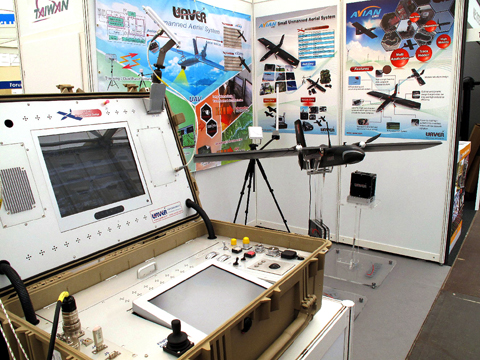With an eye on the vast international aerospace market, Taiwan for the first time opened an exhibition pavilion this year at the Internationale Luftfahrt-Ausstellung (ILA) air show in Berlin.
The Taiwan pavilion is hosted by the Gloria Material Technology Corp (GMTC, 榮剛材料科技), a fabricator of special alloy materials and Carbon-based Technology Inc (CBT, 碳基科技), which designs and produces unmanned aerial systems.
The ILA, held every two years, has been an important event in the European aerospace industry since it first began in 1909.

PHOTO: CNA
About 1,150 exhibitors from 47 countries are attending the exhibition, giving it the largest-ever participation rate. The show, which opened on Tuesday, ends tomorrow.
Hsieh Mei-hua (謝美華), an executive of GMTC’s planning and control center, said the company hoped to use the show to gain a foothold in the global supply chain for the manufacture of Airbus aircraft.
“GMTC will have a bigger chance to become a parts and components supplier to the international aerospace sector by exposing itself in Europe more often and making more contacts with other businesses,” she said.
The company, founded in southern Taiwan in 1988, is the country’s first specialty steel fabricator to engage in the manufacture of special alloy materials. In recent years, it has gained certification from many international aerospace manufacturers and energy producers, including Boeing, Siemens and GE, Hsieh said.
Meanwhile, Taichung City-based CBT’s unmanned aerial system is attracting a lot of attention at the show. CBT chairman Chung Wen-lung (鍾文隆) said he is confident of securing government deals at the show with the system, which includes a 3.45kg electric-powered vehicle with a 90-minute cruising time.
The craft is designed for disaster rescue and military monitoring missions and has the ability to transmit images directly to a ground control center, Chung said.

When an apartment comes up for rent in Germany’s big cities, hundreds of prospective tenants often queue down the street to view it, but the acute shortage of affordable housing is getting scant attention ahead of today’s snap general election. “Housing is one of the main problems for people, but nobody talks about it, nobody takes it seriously,” said Andreas Ibel, president of Build Europe, an association representing housing developers. Migration and the sluggish economy top the list of voters’ concerns, but analysts say housing policy fails to break through as returns on investment take time to register, making the

‘SILVER LINING’: Although the news caused TSMC to fall on the local market, an analyst said that as tariffs are not set to go into effect until April, there is still time for negotiations US President Donald Trump on Tuesday said that he would likely impose tariffs on semiconductor, automobile and pharmaceutical imports of about 25 percent, with an announcement coming as soon as April 2 in a move that would represent a dramatic widening of the US leader’s trade war. “I probably will tell you that on April 2, but it’ll be in the neighborhood of 25 percent,” Trump told reporters at his Mar-a-Lago club when asked about his plan for auto tariffs. Asked about similar levies on pharmaceutical drugs and semiconductors, the president said that “it’ll be 25 percent and higher, and it’ll

CHIP BOOM: Revenue for the semiconductor industry is set to reach US$1 trillion by 2032, opening up opportunities for the chip pacakging and testing company, it said ASE Technology Holding Co (日月光投控), the world’s largest provider of outsourced semiconductor assembly and test (OSAT) services, yesterday launched a new advanced manufacturing facility in Penang, Malaysia, aiming to meet growing demand for emerging technologies such as generative artificial intelligence (AI) applications. The US$300 million facility is a critical step in expanding ASE’s global footprint, offering an alternative for customers from the US, Europe, Japan, South Korea and China to assemble and test chips outside of Taiwan amid efforts to diversify supply chains. The plant, the company’s fifth in Malaysia, is part of a strategic expansion plan that would more than triple

Taiwanese artificial intelligence (AI) server makers are expected to make major investments in Texas in May after US President Donald Trump’s first 100 days in office and amid his rising tariff threats, Taiwan Electrical and Electronic Manufacturers’ Association (TEEMA, 台灣電子電機公會) chairman Richard Lee (李詩欽) said yesterday. The association led a delegation of seven AI server manufacturers to Washington, as well as the US states of California, Texas and New Mexico, to discuss land and tax issues, as Taiwanese firms speed up their production plans in the US with many of them seeing Texas as their top option for investment, Lee said. The